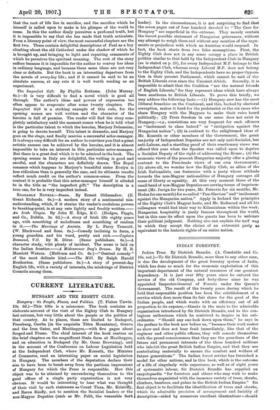C URRENT LITER,AT URE.
HUNGARY AND THE EIGHTY CLUB.
Hungary : its People, Places, and Politics. (T. Fisher Unwin. 10s. 6d.)—This title is a misnomer. The book contains an elaborate account of the visit of the Eighty Club to Hungary last autumn, but very little about the people or the politics of that country. As to places, these are lfinited to Budapest, Pressburg, Csorba (in the exquisite Titre Mountains), °reeve and the Iron Gates, and Mezehegyes,—with five pages about Szeged and Fiume. The chief interest of the book centres on the brief chapters on the magnificent State farm at Mezobegyes, and on education in Budapest (by Mr. Oscar Browning), and in the account of the Conference on Labour Legislation held at the Independent Club, where Mr. Kossuth, the Minister of Commerce, read an interesting paper on social legislation in Hungary. The members of the deputation declare their aim to have been to break away from the partisan impressions of Hungary for which the Press is responsible. How this object was to be attained by surrendering themselves to the good offices of a single party organisation is not very obvious. It • would be interesting to hear what was thought of their visit by such statesmen as Count Tisza, Mr. Krist6ffy, and Baron Bionffy, not to mention the Socialist leaders or the non-Magyar Deputies (such as Mr. Polit the venerable Serb leader). In the circumstances, it is not surprising to find that . the seven pages out of four hundred devoted to "The Case for . Hungary" are superficial in the extreme. They merely contain the barest possible statement of Hungarian grievances, without any attempt to weigh them and without any mention of the argu- ments or prejudices with which an Austrian would respond. In fact, the book starts from two false assumptions. First, the Eighty Club does not in any sense occupy a place in British politics similar to that held by the Independent Club iti Hungary . (as is stated on p. 23), for every Independent M.P. belongs to the Independent Club, whereas every Liberal H.P. does not belong to the Eighty Club, and the Independents have no proper Opposi- tion in their present Parliament, which cannot be said of the British Liberals even since the Unionist &bade. Secondly, it is impossible to admit that the Coalition "are the natural friends of English Liberals," for they represent ideas which have always been anathema to British Liberals. To prove this briefly, we may adduce the following facts :—(1) Hungary now has the most illiberal franchise on the Continent, and this, backed by electoral corruption, makes it hard for the proletariat or. the six races who share Hungary with the Magyars to make their voice heard politically ; (2) Press freedom in our sense does not exist in Hungary,—e.g., convictions are very frequent for such offences as "incitement to class hatred" or "instigation against the Hungarian nation"; (3) in contrast to the enlightened ideas of Mr. Kossuth or other members of the Government, the great majority of Independent Deputies are not only anti-Socialist, but anti-Labour, and a startling proof of their reactionary views was offered this year when the Speaker was called upon 'to deprive a Socialist Deputy of the right of addressing the House; (4) the economic views of the present Hungarian majority offer a glaring contrast to the Free-trade views of our own Government ; (5) above all, we wonder how the Eighty Club, as allies of tho Irish Nationalists, can fraternise with a party whose attitude towards the non-Magyar nationalities of Hungary outrages all sense of liberty or equality. At this very moment three of the small band of non-Magyar Deputies are serving terms of imprison- ment (Mr. Juriga for two years, Mr. Petrovie for six months, Mr. Hodza for one month) for so-called " Pan-Slavism" and" incitement against the Hungarian nation." Apply in Ireland the principles of the Eighty Club's Magyar hosts, and Mr. Redmond and all his colleagues would find their way to Kilmainham within the week. Hungarian hospitality is justly famous throughout the world, but in this case its effect upon the guests has been to unhinge their political judgment. Nothing else can explain the naïf way in which they accept the claims of an extremist party an equivalent to the historic rights of an entire nation.










































 Previous page
Previous page